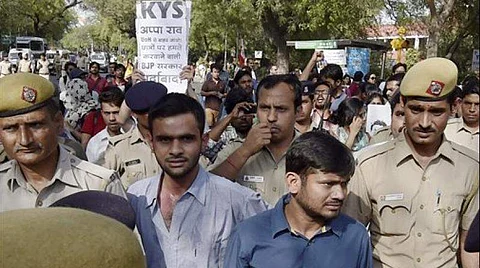

The events that took place in the Jawaharlal Nehru University on February 9, 2016, began the 'Who is an anti-national' debate in India. On that day, the students of the university reportedly conducted an event that condemned the hanging of Afzal Guru, the primary accused in the Parliament bombing of 2000 and Kashmiri separatist leader Maqbool Bhat.
This was widely criticised, especially owing to allegations that the students, India's top-rated and completely public-funded university, were raising anti-India slogans. After media outlets began airing videos of the students purportedly shouting Azadi. Following the same, an FIR was filed against a number of JNU students, including the then JNU Students' Union President Kanhaiya Kumar. Kanhaiya and two other students — Umar Khalid and Anirban Bhattacharya — were arrested the next day. The trio was later granted bail.
Interestingly, Kanhaiya was represented by former Law and Justice Minister and senior lawyer Kapil Sibal, pro bono.
A while later, subsequent forensic analysis by investigating agencies proved that the taped had been doctored and there was no evidence of separatist yelling at the event. But that was all hindsight.
The three year itch for a charge sheet
However, it took the Delhi Police a whole three years to file the case's charge sheet, which they eventually did on January 14, 2019. The charge sheet had named apart from Kanhaiya, Umar and Anirban, seven Kashmiri students — Aquib Hussain, Mujeeb Hussain, Muneeb Hussain, Umar Gul, Rayeea Rassol, Bashir Bhat and Bashara. The students (or by that point in time, former students) had been charged with offenses under sections 124A (sedition), 323 (punishment for voluntarily causing hurt), 465 (punishment for forgery), 471 (using as genuine a forged document or electronic record), 143 (punishment for being a member of an unlawful assembly), 149 (being a member of an unlawful assembly), 147 (punishment for rioting) and 120B (criminal conspiracy) of the Indian Penal Code (IPC).
Sanction me this, sanction me that
Legal experts have previously told Edexlive that it will not be possible for the Delhi police to arrest these current/former students without required sanctions from the Arvind Kejriwal government. A year ago, in April 2019, the Delhi government informed a Patiala House Court that the police had filed the charge sheet in the JNU sedition case in a 'hasty' and secretive way. While the government said that it had been filed without required sanction, the police refuted the claim saying that they'd sent a request to the government seeking sanctions and that the issuing sanctions was an administrative action, without which the case cannot proceed.The argument has been going back and forth in court till this day.
Hold on, what are these sanctions for?
According to legislative research agency PRS, criminal laws in India by way of “sanctions” allow for protective discrimination in favour of public officials. Under various laws, sanctions are required to investigate and prosecute public officials. Over the past 15 years, these provisions of the law have been revisited by the judiciary and the legislature. The Criminal Procedure Code 1973 and the Prevention of Corruption Act 1988 provides that to prosecute a public servant, permission or sanction has to be secured from the government (central or state) for which the official works. Arguments that are often advanced in favour of such sanctions are that these ensure that (a) frivolous and vexatious cases are not filed, (b) public officials are not harassed, and (c) the efficacy of administrative machinery is not tampered with. Further, the requirement of sanction to investigate was also defended by the government before the Supreme Court in certain cases. This applied in this case as all the accused were students of a government-funded central university.
And what of the accused?
A year later, Umar and Anirban tell us that they are yet to see the charge sheet. "We congratulate the Delhi Police, the Home Ministry and the government for waking up from their deep slumber after February 9, 2016, and barely 3 months before the general elections 2019 and filing a charge sheet against us," the duo said a year earlier.A year since then, the status quo remains unchanged.
Where are they now and what are they doing?
In a span of four years, a lot has happened in the lives of the JNU trio. After joining the CPI, Kanhaiya fought the 2019 Lok Sabha polls from Bihar's Begusarai. However, he lost the election by quite a margin to BJP heavyweight Giriraj Singh. Umar Khalid and Anirban left their previous organisation, the Democratic Students' Union and started a new student union — the Bhagat Singh Ambedkar Students' Organisation (BASO) in 2016.
One more Delhi Election has passed. Sanctions still missing?
After a vitriolic and hectic three months — which saw everything from violence on campuses in Delhi over the CAA to a frenzied election campaign in Delhi which Arvind Kejriwal's APP swept again — the question of the long-pending Azadi case has emerged. Recently, on February 19, 2020, a Delhi court had adjourned the matter till April 3, as the Delhi government is yet to grant the requisite sanctions in the matter. The Delhi government has also been asked to file a status report in the matter and the judge has asked the Delhi Police to send another reminder to the Delhi Government for the sanctions.
What will happen next?
